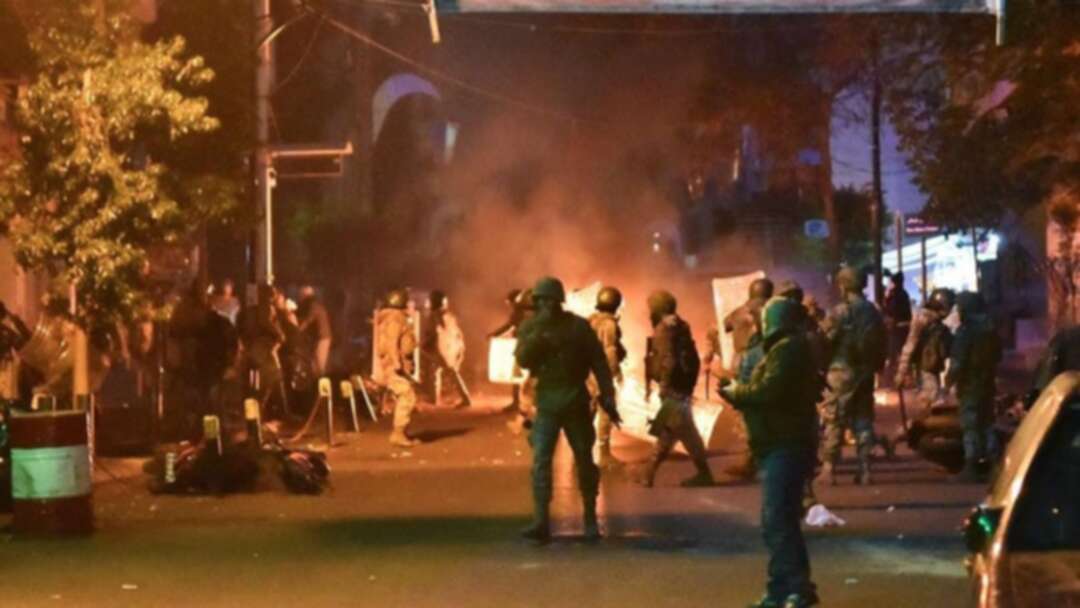-
Scuffles continue in Lebanon between Hariri supporters and security forces

On Friday night, the Lebanese army used tear gas to disperse hundreds of supporters of the outgoing Prime Minister, Saad Hariri, protesting the assignment of the new Prime Minister, Hassan Diab, who is supported by Hezbollah.
The clashes between the army and the demonstrators took place in the Corniche of Mazraa, in the Beirut.
Scuffles on the major avenue in Beirut intensified after Sunnis who support Hariri closed it to protest Diab’s nomination. When the army worked on opening the road in Beirut’s western Mazraa neighborhood, the protesters hurled stones and firecrackers at troops and riot policemen, injuring at least seven soldiers, the Lebanese army said.
The scuffles had begun on Friday morning when protesters first closed the avenue in Mazraa where Hariri enjoys wide support. Hours after the avenue was reopened, protesters closed it again leading to the intense scuffles that lasted until shortly before midnight.
Outgoing Interior Minister Raya El Hassan, a member of Hariri’s Future Movement, issued a statement urging protesters to leave the streets “to avoid dangers and strife.”
The protesters had earlier blocked the main highway linking Beirut with southern Lebanon with burning tires, causing a miles-long traffic jam. The army opened the road briefly in the town of Naameh before protesters closed it again with flaming tires.
The road closures in Beirut and Naameh were carried out by protesters angered by what they said was Hezbollah and its allies deciding who takes the country’s top Sunni post. Hezbollah has backed Hariri for prime minister from the start, but they differed over the shape of the new government.
“I ask (protesters) to give us a chance to form an exceptional government” that can work on resolving the country’s many problems, accumulated over the past 30 years, Diab said.
It was not immediately clear if the riots that broke out in Beirut will affect Diab’s consultations with members of parliament scheduled for Saturday in preparation for the formation of the Cabinet.
Diab faces huge challenges in trying to form a consensual government that would also satisfy protesters. Demonstrators have been on the streets since mid-October, seeking to sweep away an entire political class they deem as corrupt.
source: The Associated Press
You May Also Like
Popular Posts
Caricature
BENEFIT Sponsors BuildHer...
- April 23, 2025
BENEFIT, the Kingdom’s innovator and leading company in Fintech and electronic financial transactions service, has sponsored the BuildHer CityHack 2025 Hackathon, a two-day event spearheaded by the College of Engineering and Technology at the Royal University for Women (RUW).
Aimed at secondary school students, the event brought together a distinguished group of academic professionals and technology experts to mentor and inspire young participants.
More than 100 high school students from across the Kingdom of Bahrain took part in the hackathon, which featured an intensive programme of training workshops and hands-on sessions. These activities were tailored to enhance participants’ critical thinking, collaborative problem-solving, and team-building capabilities, while also encouraging the development of practical and sustainable solutions to contemporary challenges using modern technological tools.
BENEFIT’s Chief Executive Mr. Abdulwahed AlJanahi, commented: “Our support for this educational hackathon reflects our long-term strategic vision to nurture the talents of emerging national youth and empower the next generation of accomplished female leaders in technology. By fostering creativity and innovation, we aim to contribute meaningfully to Bahrain’s comprehensive development goals and align with the aspirations outlined in the Kingdom’s Vision 2030—an ambition in which BENEFIT plays a central role.”
Professor Riyadh Yousif Hamzah, President of the Royal University for Women, commented: “This initiative reflects our commitment to advancing women in STEM fields. We're cultivating a generation of creative, solution-driven female leaders who will drive national development. Our partnership with BENEFIT exemplifies the powerful synergy between academia and private sector in supporting educational innovation.”
Hanan Abdulla Hasan, Senior Manager, PR & Communication at BENEFIT, said: “We are honoured to collaborate with RUW in supporting this remarkable technology-focused event. It highlights our commitment to social responsibility, and our ongoing efforts to enhance the digital and innovation capabilities of young Bahraini women and foster their ability to harness technological tools in the service of a smarter, more sustainable future.”
For his part, Dr. Humam ElAgha, Acting Dean of the College of Engineering and Technology at the University, said: “BuildHer CityHack 2025 embodies our hands-on approach to education. By tackling real-world problems through creative thinking and sustainable solutions, we're preparing women to thrive in the knowledge economy – a cornerstone of the University's vision.”
opinion
Report
ads
Newsletter
Subscribe to our mailing list to get the new updates!






















